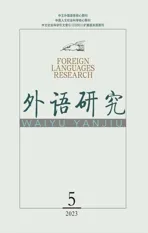Abstracts of Key Papers in Current Issue
2024-01-02
Thought Experiment in Philosophy of Language: Characteristics and Methodsby DU Shihong &ZHOU Fangyuge,p.1
Philosophy of language in a broad sense exists throughout the development stages of western philosophy,which has come up with typical and influential thought experiments.Philosophy of language is characterized by its conceptual analysis supported by necessary thought experiments.What are the characteristics of thought experiment? What are the common methods of thought experiment? What are the purpose and value of thought experiment? The three questions have brought about a conceptual analysis of the thought experiment proper in detail.Based on the present analysis,it has been found that three types of thought experiments corresponding to three kinds of methods are common in philosophy of language.The three representative thought experiments of Wittgenstein’s Beetle,Putnam’s Twin Earth and Quine’s Gavagai have been reviewed with the purpose of disclosing the purpose and significance of thought experiment.
Key words:philosophy of language,thought experiment,Wittgenstein’s Beetle,Putnam’s Twin Earth,Quine’s Gavagai
Negative Concord in Standard Englishby WEN Weiping,p.19
Negative concord (NC) occurs in Old English and the phenomenon continues up to Middle English,getting extremely common in this period.With its recession in the later period,Modern Standard English is not characterized by the operation of NC.The observed decline and ultimate loss of NC can be attributed to the internally-driven motivations for language change—ne-drop and the development of NPIs.Ne-drop comes with the introduction of some negative indefinites,making a first step to the reduction of NC in Middle English.By the Late Middle and Early Modern English periods,speakers were endowed with two grammars,i.e.“not...N-words”and“not...any-words”,these two grammars coexists competing for the same structural position.With the rise of negative polarity items in contexts that are strictly confined to n-words NC,virtually disappears.The increase and decline of NC in Standard English provides an overall picture of multiple negation in English and well justifies“Jespersen’s cycle”.1
Key words:Standard English;negative concord;multiple negation;ne-drop;NPIs
The Basis for the Design of the School-Based College English Curriculum in China—On the Orientation of EGP and ESP in College English Educationby CAI Jigang,p.58
Many colleges and universities still design their college English guidelines and curriculums on the basis of three aims stated in College English Curriculum Guidelines against the background of the considerable reduction of college English credits.The basic and intermediate courses of English for general purposes (EGP) accounts for the high percentage of the credit hours and cross-cultural education is still the required course.We argue that the ultimate purpose of college English is to meet students’needs for their discipline-specific studies and for their future careers.Therefore,English for specific purposes (ESP) should be the main courses while the content of EGP and crosscultural courses might be integrated into ESP.
Key words:College English,school-based teaching requirements,English for general purposes,English for specific purposes,cross-cultural communication
A Sociological Analysis of Liu Bannong’s Foreignization Strategy by“Translating Folk Songs into Folk Songs”by WAN Bing,p.77
Liu Bannong studied in Britain and France,collected foreign folk songs,and published his translated folk songs in periodicals,such as Yusi Weekly and World Daily.A collection of the translation of those foreign folk songs was published in April 1927.Due to the restriction of Yusi Press and the guidance of the“Ballad Movement”and the peers’habitus,Liu Bannong’s translation theme,target language and translation strategies are different from those in“Translating into Rhyme”and“Translating into Prose”.On the whole,he translated foreign folk songs in colloquial Chinese,and he adopted the foreignization translation strategy.Moreover,the“Ballad Movement”had a profound impact on the theme and language of the translation and creation of new poetry.From the perspective of sociotranslatology(social praxeology proposed by P.Bourdieu and actor network theory by B.Latour),this paper explores Liu Bannong’s poetry translation activities and the causes behind them,aiming to reveal the social features of translation.1
Key words:Liu Bannong,translating into folk songs,foreignization strategy,sociology
